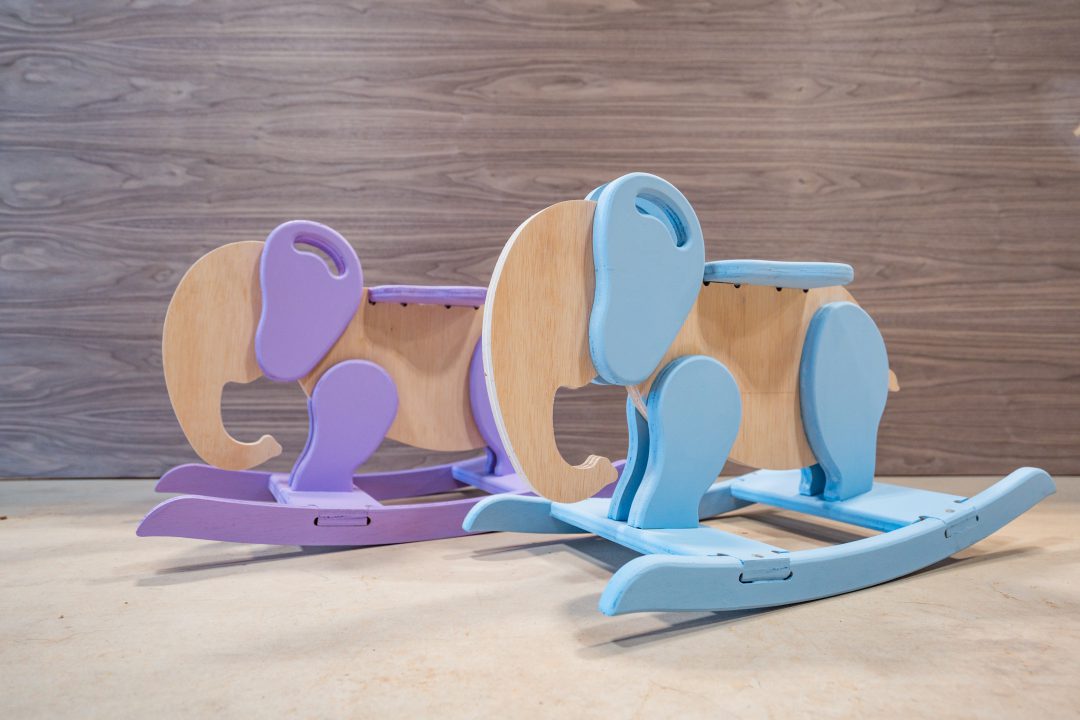
How To Make A Toddler Rocker and Walking Kangaroo
- Home Decor DIY Projects
- April Wilkerson
- Updated: February 26, 2023
Thinking about building your own toddler rocker? Check out this project where I show you how I built a DIY toddler rocker and walking kangaroo!
This week I’m focused on the kiddos and built two projects designed just for them. The first is this super cute toddler rocking elephant…

… and the second is a really fun self walking kangaroo.

While I don’t have kids, my newest nephew will hopefully love the elephant rocker and the self walking kangaroo is an easy thing to pack for any gathering where little ones will need some entertainment. Lets get into how to build both.
Lets start with the elephant rocker, this one is sized to fit a 1-3 year old and I started off by sketching out the elephant in my 3D modeling software called SketchUp. In the program you can import in a vector or an image and trace it then refine it from there. Keep that in mind if you would like to do a different animal shape for the body of yours.

After refining the shape, I used my CNC to cut out templates for the different parts.
In addition to the main body outline, the template also has some locating holes because I’ll be using dowels to help locate each part correctly on the elephants body. So I first use a drill bit in my drill to punch these locating holes out.

Now I can use some doubled sided tape to stick the template to my 3/4” plywood and use a flush trim bit in my router to cut the body out. Now I’m using plywood but you could very well place the template on a solid wood as well and make everything thicker.

After making a complete pass around the template, I used a shop chisel to pry the template off the top of the ply then repeated for the other parts of the elephant. This part is the most time consuming but a way to cut that down is to stack two boards on top of each other and cut every part that needs a pair, at the same time.

Once all the parts are cut out I did a little bit of clean up before moving on to assembly. Even though I’m using plywood that was already sanded on one side, I went over every face as well as edge with my Triton Palm ROS. I also used my down draft table I built into my main workbench last year, that’s a handy feature.

For the body with all it’s concaved curves, I put in the second to largest spindle and used the spindle sander to clean up the edges.

Then to soften the overall look but also the feel for those cute little hands, I stuck a round over bit in my router table and went over all the edges. For this I’m using the 1/4” Infinity round over bit, and if you’re curious I used the Infinity Mega Flush Trim bit for the pattern cutting.

Now of course there are a million ways of finishing the rocker to make it adorable but I decided to leave the body of the elephant as ply and paint the other parts. Note: I only painted the front side of any part that will glued on the body. So the legs, ears, have a raw back so to not interfere with the quality of bond when assembling in the next step.

Assembly is very simple. As I mentioned before I used dowels to locate the parts exactly where they needed to go. This ensure the ears and bottom of the feet line up perfect with their pair. I would first cut a small piece of dowel that’s just long enough to go through the body and stick part ways into he counter bore hole in the joining part. Using a mallet when needed to make sure it sat flat.

I’m using a fast setting wood glue on the back of each part then two ways of securing it….you can either use a brad nailer to hold it in place while the glue cures, or you can set it in clamps until dry. I went with using a brad nail then just used a little putty and touch up paint to fill in the tiny holes it leaves behind.


Once the body was put together, I set it aside and started putting together the rocker. This is the only section where I used screws. I first put down some wood glue then inserted the rocker’s slats. The fit is pretty tight so I used a Bessey clamp to squeeze down on it and compress it into place, then used a countersink and two screws. This is another area you can use putty and touch up paint to cover things up afterwards if you’d like.


Next I flipped the whole thing over and centered the elephant to the center of the rocker then again use a counter sink and two screws to secure things annnnd that’s it.

My newest little nephew is too many states away to trial this out for me, but I was able to round up a toddler of a friend to give it a good sit and rockin.
If you’re interested in building your own I do have animal rocker templates available here! On top of the elephant I also have a few other animals available.



Ok moving on to project number 2!
Look how cool this self walking Kangaroo is!?

I saw this on Instagram and was blown away by how it propels itself forward and was dying to try to replicate it. It is very finicky to get it working correctly, but I have a free download walking kangaroo template of the shape to try and help things out.
I started by cutting out the paper template and using a little bit of spray adhesive to attach it to a 1×8 pine board.

Once the body and leg are in place, I used the miter saw to cut the board up in pieces so that I could stack them on top of each other and make multiples at the same time.

After getting that length down, I ripped them at the table saw, using the first one with the template on top to set up the cut.

Next I used some hot glue to temporarily stick all the leg pieces on top of each other, and the same with the body pieces. So that I could make one profile cut at the bandsaw but end up with enough parts to make three roos.

Now before taking apart the pieces, I cleaned up the shape over at the sanders, using the spindle sander to clean up all the concaved curves and the belt sander, turned upside down on the convexed curves.

Then it was over to the drill press to punch all the needed holes before prying the built up layers a part.

The legs pivot on the body by way of a dowel and you want this to be just a tad bit oversize from the dowel size you’re using so that the legs will be able to move freely. I recommend having your dowel on hand when you’re drilling this hole, to test fit it and make sure the part can spin easily. While here you can also punch through to make the eye hole.
With everything cleaned up, next was assembling which is pretty straight forward but one thing to pay attention to is the dowel needs to be glued in place without gluing the legs down to the body. If the legs can pivot freely, your roo won’t walk.
I would apply a little glue to the dowel then I would apply a dab of wood glue to the inside of the leg hole.

Then place an over cut dowel inside, I would wipe off the excess glue if any came came out, then place a washer over the dowel before applying a dab to the body hole and placing the dowel into the body. Next a small washer can be placed on the other side of the body then the other leg can be threaded on, also with a small dab of glue in the leg hole. At this point wipe off any excess glue on the outside.

That pivot point will allow the legs to move forward and backwards to walk. There is a second, much smaller hole near the heel of the roo where a much smaller dowel needs to be glued into place. You can see I left it long on both sides at this point. This small wooden bar will be a stop block for the walking action. It limits how far forward the legs are able to move.

I’m not sure who came up with this, but it sure is clever.
After letting it dry, lets give it a go. In order to work the roo has to be placed on an incline and the degree of this slope is something else to play around with.

I grabbed some scrap boards and containers to make my ramp. If the ramp isn’t steep enough then the roo won’t have enough forward falling momtium to keep the cycle going. However if it’s too steep, then it will just fall on it’s face. You’ll see that after a practice run, I changed the height by a pencil’s width and that made all the difference.

Maybe it would be a fun game for kids to play with the different heights until it works, but to prevent them from having to fuss with it, I recommend building a simple ramp that would accompany the toy so that when they want to play with the roo, they bring out both. Oh my gosh I not even a kid but I think this toy is amazing.

I hope you enjoyed both of these projects, and of course I would love to hear your thoughts on them in the comments section down below.
Don’t forget I have templates for both, if you would like to make your own!
I also have other templates available for a wide variety of other projects here if you’d like to look around and support what I do!
If you haven’t already, don’t forget to sign up at the top of this page for my newsletter so you don’t miss new projects!
(Most of the links listed above are affiliate links. As an Amazon Associate I earn from qualifying purchases. Thank you for supporting me in this way.)
2 Responses
Awesome stuff April! ????????????????????????????????????
these are so cute and look fun.
what is the name of the program you use the to design the Toddler Rocker?
Comments are closed.